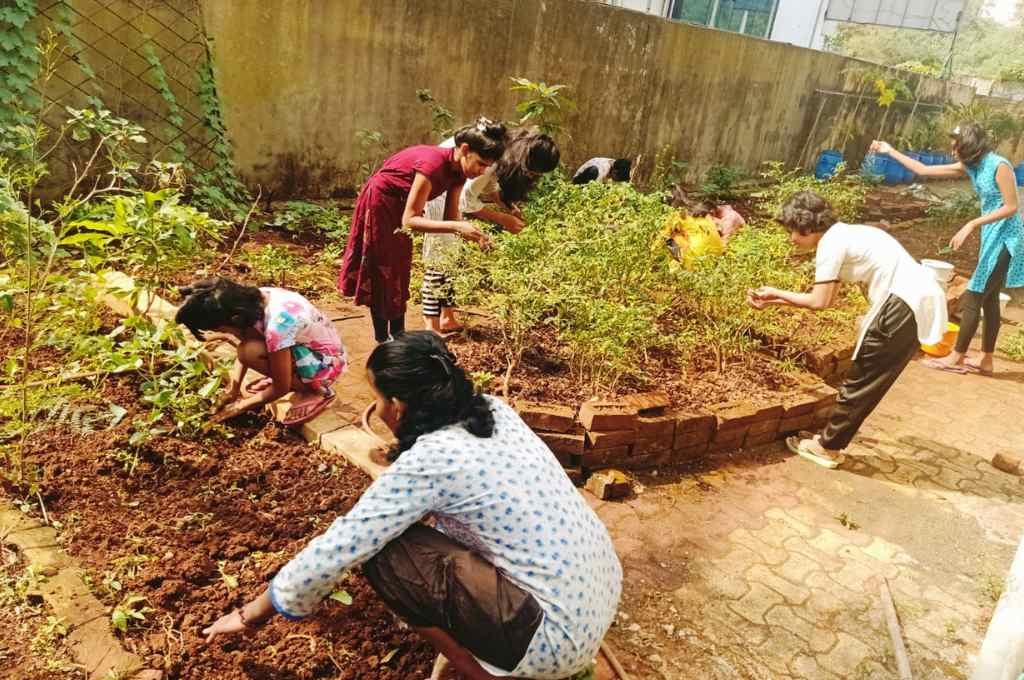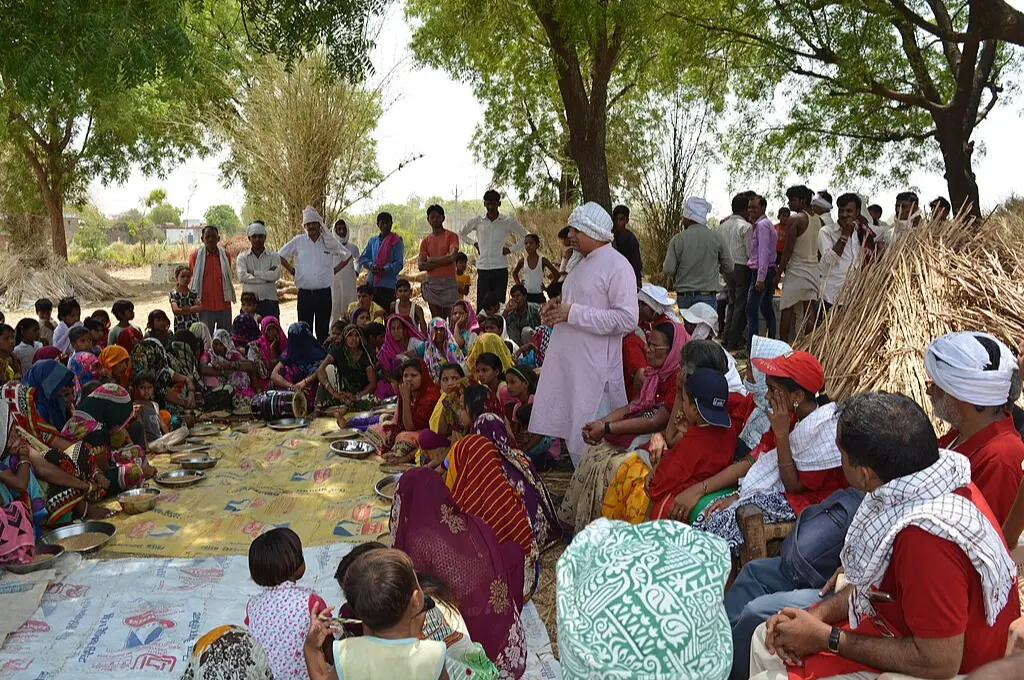I was born in a village in Sangli district, Maharashtra. When I was in the fifth standard, my family of six members—my parents, two sisters, brother, and I—shifted to Mumbai for better livelihood opportunities.
I completed most of my education in Mumbai. My first job was in the share market, but it couldn’t keep my interest for long. I realised I might not be built for the typical nine-to-five job. While looking for alternatives, I came across an advertisement in the newspaper about a paraprofessional course in social work that trained volunteers in the field of development. I was curious about the social sector because, to me, it combined a study of human behaviour with contribution to the society. The three-month course took me on many field visits where I met a lot of social workers, which gave me confidence. During the course, I also learned about the master’s in social work (MSW) programme, which I undertook and completed. After the MSW, I started interning at Prerana—a nonprofit that works on anti-human trafficking and rescue and rehabilitation of women and children—in 2013. Later, I joined Naunihal—a children’s home run by the organisation in Maharashtra’s Raigad district—which provides a safe space for young girl children in need of care and protection as categorised by the JJ Act 2015. Most of the girls at the centre are survivors of violence and abuse.
I am now a superintendent at Naunihal. Working with children is not something I always aimed for, but over the years I have started enjoying it. I have realised that children, when compared to adults, are more open to discussions and learning, and they can be easily sensitised and made aware of social issues.
5.00 AM: In the months when I have morning duty, I wake up at 5 am and get the children ready for school. I check that their lunches are packed and that they have had breakfast and are wearing clean shoes and uniforms. I also handle administrative tasks such as ensuring their documents are up to date.
Our centre falls under the jurisdiction of the district’s child welfare committee (CWC), which is responsible for the care, protection, and rehabilitation of a child under the Juvenile Justice Act. Most of the children referred to us are victims of child sexual abuse, which means their cases fall under the POCSO Act. This figure used to be less four to five years ago, but recently we have noticed a jump. Of late, we’ve also noted an increase in consensual romantic relationships among underage children. Naunihal is only for female children aged seven to 18. However, in emergency cases, age isn’t a restriction and we take in any child sent to us under the CWC’s orders. We have even admitted a seven-day-old at the institution.
At any point in the last two years, with some monthly variations, we have had 20–25 children living in the facility. This means that there are always children coming and going. If a child is sent to us from a different district in an emergency situation, they are usually sent back to their own district. But as long as they are at the facility, the responsibility of their holistic development—which includes health, education, recreation, and counselling—lies with us.
9.30 AM: I start attending to the cases that the CWC has sent us either the previous night or the same morning. These cases are brought to us by the order of the district CWC. I make sure the children have everything they need, such as their welcome kit and orientation details, and then proceed for breakfast. We have a briefing meeting at 10 am with the entire staff to plan our day. Every member is assigned a task; for example, going on a home visit to a child’s place, accompanying them to their medical test, taking them to their court hearing, and escorting them when they are being sent back home.
We are with the child during every step of the process. We visit their home within 15 days of admission and inform them about their rights, the legal process, the information that’s needed, and the time frame of their case to the best of our knowledge. When there is a procedural delay from the police, the CWC, or the medical staff, we look into it and try to learn more about the cause, and communicate the same to the child in a sensitive manner.
Care requires human interaction, consistency in intervention, and a lot of time and effort.
The case is not closed after the child is restored to their home. With the order of the CWC we are officially required to follow up and then submit reports to the CWC monthly for three months, and then quarterly for a year, but we continue to follow up depending on the need of the case and support with counselling, medical, and educational needs. Care is not a vaccine that you give a dose of and get done with. It requires human interaction, consistency in intervention, and a lot of time and effort.
Cases of familial abuse call for a deeper understanding of the child’s family because the actions of people close to them put extra pressure on them. For example, a mother wanted her child to take back the complaint because the accused was the child’s stepfather. We talked to the mother and learned that the stepfather was the sole earning member of the family; her concern was that if the father was arrested, she would not be able to run the household as she had two other daughters to raise. So we helped the mother get a job, which in turn ensured that the child is not pressurised to withdraw her complaint.
However, in all situations, we ensure that we do not influence the child’s decision. If they decide not to participate in the process, such as the legal case, we don’t try to change their mind and let them choose their own pace. At the same time, we continue giving them information so they can make an informed decision. Our job is to discuss the pros and cons of the legal process with them, especially if they express the need for it. We equip them with the tools to make an informed choice. It is a difficult situation for us knowing that an accused might run free, but supporting the child is our priority.
1.30 PM: The staff eats with the children because the lunch table is an informal space for casual conversations. Children can relax and talk about things that aren’t triggering in nature and they are able to make friends with one another.
During these chats, we also get to understand how the kids perceive the children’s home and how their ideas about it are formed.
Children have told us that they have heard both extremes—from parents saying, “At the children’s home, you’ll understand how other children live, how difficult their lives are” to authorities stating, “If you live here, you can become a police officer, air hostess…” At times, the police tell them that they will be out of the children’s home in a couple of days. But this false hope doesn’t help anyone. The children give statements to the police and the district magistrate separately; we familiarise them with these processes and let them know about child-friendly procedures of the law. Then there’s a medical examination and a social investigation report for which we speak with the child, visit their house, and document every aspect relevant to the case; we submit this report to the CWC, and it plays a crucial role in the decision about the child’s restoration and rehabilitation. So, the child is often at the children’s home for a month or two if not more. There have been cases where children have stayed for six months to a year.

4.00 PM: We take a two-hour break at 4 pm. I spend this time with the kids or do other recreational activities. I really like gardening and have planted many trees. I invite the girls to plant trees with me if they show an interest. We grow items such as spinach, okra, and curry leaves. It makes the children happy, which brings me joy. Naunihal also has a kitchen garden. We encourage the children to participate in planting samplings and nurturing them—it helps them relax.
Since we’re constantly exposed to trafficking and POCSO cases, we can sometimes get desensitised.
The proceedings of the case can be exhausting for the children. They are expected to talk about and share the details of their case with multiple stakeholders such as the police, the CWC, the medical staff, the counsellor, and the caseworkers. They get so lost in the chaos that they feel tired and angry, and think they’ve made a huge mistake by reporting the case. We have to be mindful of these things. Since we’re constantly exposed to trafficking and POCSO cases, we can sometimes get desensitised to the child’s condition.
I remember, as a fresher, I was working with a child who confided in me about the abuse she faced and I became a complainant in her case. During her medical examination, the doctor brought in four or five trainees to show them the procedure. I intervened to tell them that the child had suffered enough and this wasn’t the time for education. I was hesitant as it was my first case, even though I had undergone trainings to understand the intricacies of the POCSO Act, the Immoral Traffic (Prevention) Act, and the JJ Act. But that was theoretical knowledge, and here I was actually witnessing what a victim goes through.
8.00 PM: Our team debriefs after dinner, discusses the progress made during the day, and decides what needs to be done the next day. I make sure that child protection training is undertaken by the team every month and is implemented correctly. I also ensure that the staff to child ratio at the centre is maintained; as of now, every member handles nine to 10 cases at a time. My team should never be overwhelmed because that is good neither for them nor for the children.
I follow up on all administrative tasks and check if the team has submitted their case files; I also give them feedback and try to understand and address any issues they might be facing. We learn from one another by discussing how we solved a certain issue; it can be anything, including a problem someone had with the police, the CWC, or the rehabilitation process.
Although we’re a facility for institutionalisation of children in need, we also follow the principle of the JJ Act that institutionalisation should be the last resort. We evaluate each case to understand whether a child needs institutionalisation. We had a case of child abuse where the parents were from a low-income, migrant family and the mother had medical issues. We thought it was better to help the family arrange valid documents to avail government benefits, such as ration, and get the child admitted to a school rather than keep her at the children’s home for a longer term. We always make sure to assess needs before suggesting rehabilitation options.
10.00 PM: Sometimes we take the children out for dinner; otherwise, we watch movies with them. I personally like Govinda’s Bollywood movies from the ’90s; when I am alone, I also watch Comedy Nights with Kapil. Comedy shows and movies lighten the mood after a long day of stressful work and I consider them good for my mental health.
We conduct routine checks of the children’s rooms at night before everyone goes to sleep. The kids know which room belongs to which staff member and can approach us at any time if they need anything.
My parents worry about me since I live away from home. I don’t discuss my cases with them; as long as they know I’m safe, they’re happy.
I do other things to keep my mind off work. On my day off, I work at an animal shelter. Whenever I am free, I help with taking the cats and dogs to the clinic. Another interest of mine is minimalism. I recently attended a workshop on it that explained how frugality and reducing the burden on nature can make life easier for everyone.
As told to IDR.
—





